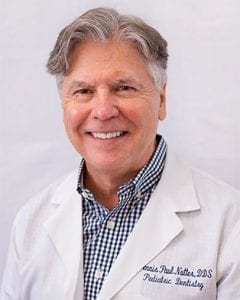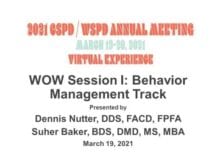Dr. Dennis Paul Nutter – “12 reasons why pediatric dentists should accept young children’s distress behavior as pain behavior during procedures involving tissue trauma”
As a child’s age decreases from age seven, children increasingly lack the cognitive development to discriminate between the scale points of self-report pain measures. This forces dentists, physicians and nurses to observe a child’s behavior in order to score their pain intensity. But behavior management authors have long argued that not all of young children’s negative behavior during procedures is related to pain. They contend that children’s ostensible pain behavior during procedures is not always authentic and is largely contaminated by anxiety, fear or intentional “misbehavior”. In 2012, 46 percent of pediatric dentists who were members of AAPD believed that it should be the dentist who decides how much pain a child is experiencing during a procedure and not the child. This presentation will give 12 reasons why a child’s distress behavior that occurs coincident with procedural tissue trauma should be assessed as pain behavior until the child says otherwise.
Dr. Suher Baker – “Efficacy of an Anxiety Reduction Program for minimizing the need for dental treatment under general anesthesia”
The purpose of this retrospective pilot study is to investigate the efficacy of a systematic Anxiety Reduction Program (ARP) using progressive desensitization to reduce anxiety in children to a level allowing dental treatment to be comfortably accomplished in-office and minimizing the need for general anesthesia (GA). In our methods we examined records of 227 patients who underwent ARP during 2017-2019. Inclusion criteria included healthy children who came to our office directly or had been referred by dentists who were not successful at performing in-office treatment due to the child’s high level of anxiety. Data was collected for patients age, gender, referring specialty, anxiety level at first visit, age at 1st ARP, number of ARP’s and whether treatment was provided in- office or with GA subsequent to the ARP visit.
Educational Objectives:
For Dr. Nutter:
- Three negative procedural sequelae of untreated procedure pain.
- How a well-recognized tendency of human nature primes dentists to be biased in their assessment of children’s procedure pain.
- Twelve reasons why pediatric dentists should accept the behavioral pain reports of young children during invasive procedures.
For Dr. Baker:
- Educate dentists on new alternatives in behavior guidance such as progressive desensitization for the anxious child.
- Advocate for child management in the dental office using noninvasive non pharmacologic behavior guidance techniques rather than costly pharmacologic management with general anesthesia.
- Personalize patient behavior guidance techniques for anxious patients to ensure optimal memories at the dental office in order to extinguish long term fear from painful dental experiences.
CE Credit Units:
1 CEU
Level of skill recommended for participants:
Of interest to Dentists, Students & Residents, Dental Auxiliaries and Office Staff
Refund Policy:
There are no refunds for CSPD Online CE courses. For any questions, please contact CSPD Administration at admin@cspd.org or call 916-231-2412.
Legal Disclaimer
The CE provider (CSPD) uses reasonable care in selecting and providing content that is accurate. However, the CE provider does not independently verify the content or materials. The CE provider does not represent that the instructional materials are error-free or that the content or materials are comprehensive. Any opinions expressed in the materials are those of the author(s) of the materials and not the CE provider. Completing one or more continuing education courses does not provide sufficient information to qualify the participant as an expert in the field related to the course topic or in any specific technique or procedure. The instructional materials are intended to supplement rather than substitute for the knowledge, expertise, skill and judgment of a trained health care professional.
Privacy Policy
The continuing education website of the California Society of Pediatric Dentistry is CSPD – Online Continuing Education. We respect the privacy of the user to the site. The Privacy Policy addresses our use of the information collected by virtue of your use of CSPD – Online Continuing Education.
The information we collect on our website is used to improve the content and to advance our mission of exceptional online continuing education.
We may collect the domain name and the IP address of visitors to our and use statistical software to create aggregate and user-specific information on the pages that our users visit. Email addresses may also be collected from purchases and/or user registrations.
We use cookies that enable us to administer our website more effectively in the transmission of online education.
You have the right to contact us in any matters that pertain to your privacy and we will promptly correct inaccuracies that may appear.
We use industry-standard encryption technologies when transferring and receiving consumer data exchanged on our site. When users make payments via credit cards, we only submit the information needed to obtain payment to the appropriate clearinghouses. We do not store or reuse this credit card information unless you have given us your authorization.
CE Policy:
![]()
The California Society of Pediatric Dentistry (CSPD) is an ADA CERP Recognized Provider Approved by the American Academy of Pediatric Dentistry. ADA CERP is a service of the American Dental Association to assist dental professionals in identifying quality providers of continuing dental education.
ADA CERP does not approve or endorse individual courses or instructors, nor does it imply acceptance of credit hours by boards of dentistry. Concerns or complaints about a CE provider may be directed to CSPD at (916) 231-2142 or to ADA CERP at www.ada.org/cerp
Credit is awarded on an hour-for-hour basis. Each attendee should claim only those hours of credit that he or she was in actual attendance of the educational activity. Participants should retain course certificate of completion for their records.
Original Continuing Education Certificates are subject to Dental Board of California audit and should be retained by the licentiate for a period of six years. Completion of these courses does not constitute authorization for the attendee to perform any services that he or she is not legally authorized to perform based on his or her license or permit type. This course meets the Dental Board of California’s requirements for above designated units of continuing education.
Course Materials Features
- Lessons 2
- Topics 0
- Quizzes 1
- Students 39
- Certificate Yes
- Assignment No
- Category Behavior Management
- Lecture Length 57 minutes
- Original Release Date March 21, 2021
- Review Date March 21, 2021
- Expiration Date March 21, 2024

 Dennis Paul Nutter, DDS, received his BS in Biology, his DDS, and his certificate in pediatric dentistry from the University of Southern California. He is the author of a series of articles on Good clinical pain practice for pediatric procedure pain that changed national guidelines for Behavior Guidance. Dr. Nutter has lectured nationally on pain neurobiology, pain assessment, and pain justification. He lectures regularly to dental residents at California dental schools, the US Air Force, and the Veterans Administration.
Dennis Paul Nutter, DDS, received his BS in Biology, his DDS, and his certificate in pediatric dentistry from the University of Southern California. He is the author of a series of articles on Good clinical pain practice for pediatric procedure pain that changed national guidelines for Behavior Guidance. Dr. Nutter has lectured nationally on pain neurobiology, pain assessment, and pain justification. He lectures regularly to dental residents at California dental schools, the US Air Force, and the Veterans Administration. Suher Baker, BDS, DMD, MS, MBA, is a dual trained board-certified pediatric dentist and dental anesthesiologist. Currently, Dr. Baker is the Senior Director of Scholarships and Academic Technologies at Momentous Technologies-WiFiesta Inc. while simultaneously providing clinical patient care in private practice for both pediatric dentistry and anesthesiology. She previously served as the Department Chair for Pediatric Dentistry at both Yale and Oregon Health and Science Universities.
Suher Baker, BDS, DMD, MS, MBA, is a dual trained board-certified pediatric dentist and dental anesthesiologist. Currently, Dr. Baker is the Senior Director of Scholarships and Academic Technologies at Momentous Technologies-WiFiesta Inc. while simultaneously providing clinical patient care in private practice for both pediatric dentistry and anesthesiology. She previously served as the Department Chair for Pediatric Dentistry at both Yale and Oregon Health and Science Universities.
